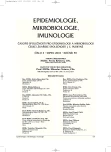-
Medical journals
- Career
Pernicious Anaemia – Diagnostic Benefit of the Detection of Autoantibodies against Intrinsic Factor and Gastric Parietal Cells Antigen H+/K+ ATPase
Authors: Lenka Sedláčková; L. Dubská; M. Průcha
Authors‘ workplace: Oddělení klinické biochemie, hematologie a imunologie, Nemocnice Na Homolce, Praha
Published in: Epidemiol. Mikrobiol. Imunol. 59, 2010, č. 3, s. 126-132
Overview
Background:
Pernicious anaemia is an autoimmune disease that causes acquired vitamin B12 deficiency. The diagnostic process includes the detection of typical changes in the blood count, low serum levels of vitamin B12, endoscopic and histological signs of gastritis and autoantibodies against the gastric parietal cells antigen H+/K+ ATPase and intrinsic factor.Objective:
Our aims were to establish immunological tests for the detection of autoantibodies against intrinsic factor and target gastric parietal cell antigen H+/K+ ATPase and to evaluate their diagnostic benefits in patients with pernicious anaemia.Material and Methods:
Sera from 95 patients were tested for autoantibodies against H+/K+ ATPase and intrinsic factor by multiplex Luminex assay. The results were compared with those of the immunofluorescence assay for the detection of autoantibodies against gastric parietal cells and with the diagnostic criteria.Results:
The autoantibodies against gastric parietal cell H+/K+ ATPase had a sensitivity of 68.2% with a specificity of 91.7% for the diagnosis of pernicious anaemia. The respective rates for the autoantibodies against intrinsic factor were 40.9% and 98.6%. The combined sensitivity and specificity rates for both autoantibodies were 86.36% and 90.28%, respectively, the combined positive predictive value was 73.08% and the combined negative predictive value was 95.59%.Conclusion:
The detection of both autoantibodies is helpful in diagnosing pernicious anaemia and the combination of the two assays increases diagnostic sensitivity.Key words:
pernicious anaemia – autoimmune gastritis – intrinsic factor – parietal cells.
Sources
1. Blizzard, R. M., Chee, D., Davis, W. The incidence of parathyroid and other antibodies in the sera of patients with idiopathic hypoparathyroidism. Clin. Exp. Immunol., 1966, 1, p. 119–128.
2. Brinton, L. A., Gridley, G., Hrubec, Z., Hoover, R. et al. Cancer risk following pernicious anaemia. Br. J. Cancer, 1989, 59, p. 810–813.
3. Carmel, R. Reassessment of the relative prevalences of antibodies to gastric parietal cell and to intrinsic factor in patients with pernicious anaemia: influence of patient age and race. Clin. Exp. Immunol., 1992, 89, p. 74–77.
4. Carmel, R. Prevalence of undiagnosed pernicious anemia in the elderly. Arch. Intern. Med., 1996, 156, 10, p. 1097–1100.
5. Davidson, R. J. L., Atrah H. I., Sewell, H. F. Longitudinal study of circulating gastric antibodies in pernicious anaemia. J. Clin. Pahtol., 1989, 42, p. 1092–1095.
6. Elsborg, L., Mosbech, J. Pernicious anaemia as a risk factor in gastric cancer. Acta Med. Scand., 1979, 206, 4, p. 315–318.
7. Hershko, Ch., Patz, J., Ronson, A. The anemia of achylia gastrica revisited. Blood Cells, Molecules, and Diseases, 2007, 39, p. 178–183.
8. Hsing, A. W., Hansson, L. E., McLaughlin, J. K., Nyren, O. et al. Pernicious anemia and subsequent cancer. A population-based cohort study. Cancer, 1993, 1, 71, 3, p. 745–750.
9. Karlsson, F. A., Burman, P., Loof, L., Mardh, S. Major Parietal Cell Antigen in Autoimmune Gastritis with Pernicious Anemia is the Acid-producing H+, K+ -Adenosine Triphosphatase of the Stomach. J. Clin. Invest., 1988, 81, p. 475–479.
10. Kokkola, A., Sjoblom, S. M., Haapiainen, R., Sipponen, P. et al. The Risk of Gastric Carcinoma and Carcinoid Tumours in Patients with Pernicious Anaemia. A Prospective Follow-Up Study. Scan. J. Gastroenterol., 1998, 33, p. 88–92.
11. Lahner, E., Norman, G. L., Severi, C., Encabo, S. et al. Reassessment of Intrinsic Factor and Parietal Cell Autoantibodies in Atrophic Gastritis With Respect to Cobalamin Deficiency. Am. J. Gastroenterol., 2009, 104, 8, p. 2071–2079.
12. Mardh, S., Ma, J. Y., Song Y. H., Aly, A. et al. Occurrence of autoantibodies against intrinsic factor, H, K -ATPase, and pepsinogen in atrophic gastritis and rheumatoid arthritis. Scand. J. Gastroenterol., 1991, 26, 16, p. 1089–1096.
13. Penka, M., Buliková, A., Matýšková, M., Zavřelová, J. Hematologie I. Praha : GRADA Publishing, 2001. p. 29–32, ISBN 80-247-0023-9.
14. Presotto, F., Sabini, B., Cecchetto, A., Plebani, M. et al. Helicobacter pylori Infection and Gastric Autoimmune Diseases: Is There a Link? Helicobacter, 2003, 8, 6, p. 578–584.
15. Toh, B., Alderuccio, F. Pernicious Anaemia. Autoimmunity, 2004, 37, 4, p. 357–361.
Labels
Hygiene and epidemiology Medical virology Clinical microbiology
Article was published inEpidemiology, Microbiology, Immunology

2010 Issue 3-
All articles in this issue
- The Use of Molecular Genetics Techniques in Clinical Microbiology – Final Report from the Workshop of the Molecular Microbiology Working Group TIDE
- Examination of Mosquitoes Collected in Southern Moravia in 2006–2008 Tested for Arboviruses
- Tick-Borne Encephalitis in the East Bohemia Region and its Microbiological Diagnostic Pitfalls
-
Lipophilic Yeasts of the Genus Malassezia and Skin Diseases.
I. Seborrhoeic Dermatitis - Pernicious Anaemia – Diagnostic Benefit of the Detection of Autoantibodies against Intrinsic Factor and Gastric Parietal Cells Antigen H+/K+ ATPase
- Prevalence of Anti-Epstein-Barr Virus Antibodies in Children and Adolescents with Secondary Immunodeficiency
- Herpes zoster in the Czech Republic – Epidemiology and Clinical Manifestations
- A Simple Method for the Detection of CD154 (CD40L) on Peripheral Blood Lymphocytes
- Epidemiology, Microbiology, Immunology
- Journal archive
- Current issue
- Online only
- About the journal
Most read in this issue-
Lipophilic Yeasts of the Genus Malassezia and Skin Diseases.
I. Seborrhoeic Dermatitis - Pernicious Anaemia – Diagnostic Benefit of the Detection of Autoantibodies against Intrinsic Factor and Gastric Parietal Cells Antigen H+/K+ ATPase
- Herpes zoster in the Czech Republic – Epidemiology and Clinical Manifestations
- Prevalence of Anti-Epstein-Barr Virus Antibodies in Children and Adolescents with Secondary Immunodeficiency
Login#ADS_BOTTOM_SCRIPTS#Forgotten passwordEnter the email address that you registered with. We will send you instructions on how to set a new password.
- Career

